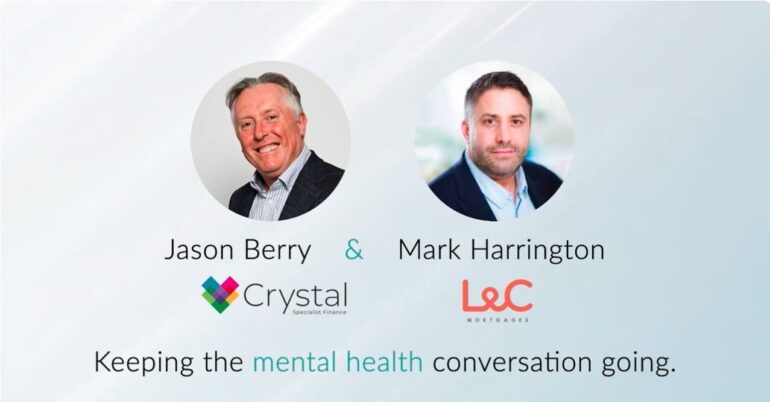Mark Harrington, CEO of L&C Mortgages, discusses the sea change in corporate culture and how we can be effective mental health ‘first-aiders’ for the latest video in the Mortgage Industry Mental Health Charter (MIMHC) interview series.
Harrington celebrated the fact that discussing mental health is no longer a taboo, but part of everyday life in the workplace, and explained how L&C works to support its colleagues, both in the office and those working remotely.
Harrington spoke to MIMHC co-founder and group sales director at Crystal Specialist Finance, Jason Berry, for the organisation’s latest ‘Keeping the Mental Health Conversation Going’ video.
The forum provides a platform for industry leaders to share insights and strategies for promoting best practice mental wellbeing in the workplace.
Harrington said: “Until very recently, admitting to mental health challenges just wasn’t accepted in society and was seen as a weakness.
“It goes back to an earlier age: when we were growing up, boys in particular were not supposed to show hurt or vulnerability – never mind your feelings, if your leg was hanging off, your Dad would tell you to stop crying!
“As a result, people experiencing poor mental health or concerns about their own wellbeing were ashamed and fearful of talking about it.
“Fortunately, in the last three or four years there has been a rapid and drastic change in society.
“At L&C now we continually talk about mental health, from the first stage of a colleague’s induction, and have appointed mental health ‘first-aiders’ to detect early warning signs of people struggling.
“Covid may have had a hand in the change, forcing us all to face our vulnerability.
“But unhelpfully, the resulting rise in remote working since the pandemic has made it harder to spot those early signs of mental health challenges.
“If someone in the office is having a hard time it can be easier to detect: you can spot mood swings, tell when people drinking too much, see from their face if they are not sleeping well.
“You can sense when a colleague’s energy levels have dwindled, and if someone is uncharacteristically angry or anxious, you can read that face to face.
“A key indicator that something is awry is when people withdraw socially and stop coming out to events.
“As soon as you detect any of these indicators you can step in to offer understanding and support.
“But the signs are harder to identify remotely. You just can’t pick up clues as well via a screen.
“That is why I am encouraging my colleagues to conduct regular one-to-one meetings face to face – even if it is only once a month, that is better than interacting exclusively electronically.
“We need to understand our peoples’ triggers, create safe spaces for them to speak and check they have a good support network.
“Empathy, understanding and really listening are key – and those are areas we can all improve on.”
Harrington’s Keeping the Mental Health Conversation Going’ episode can be found here.



